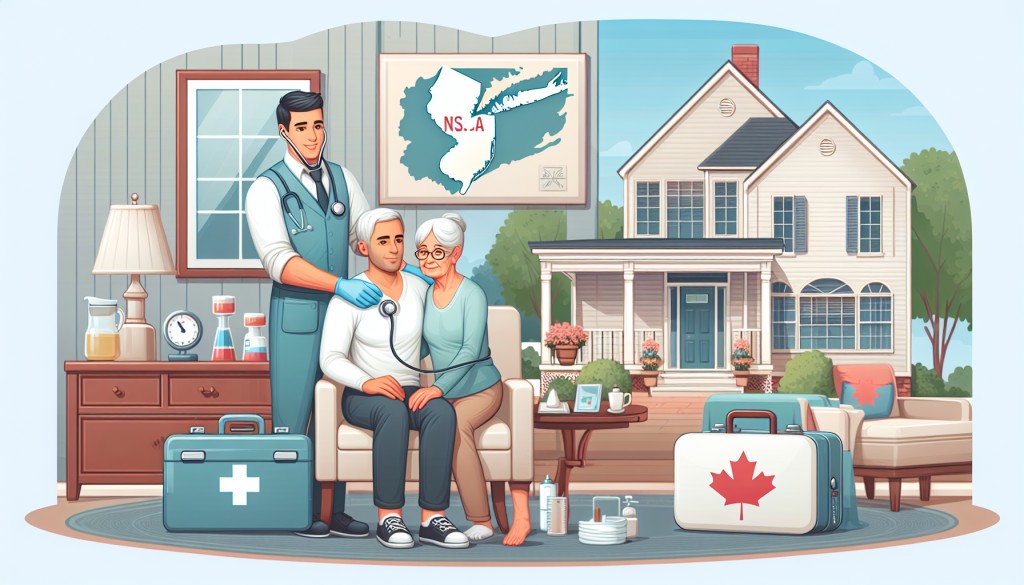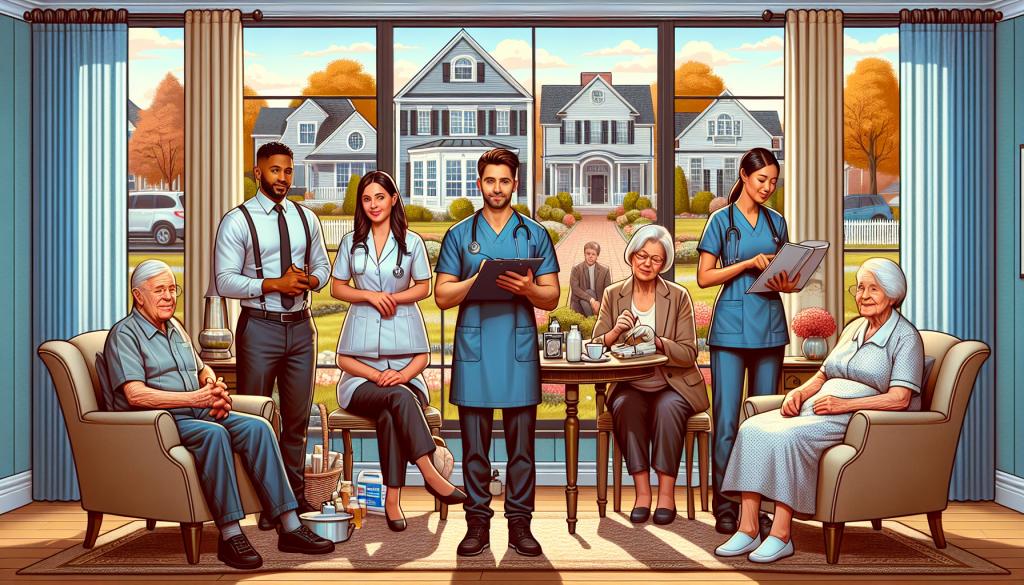Verify Licensing, Certification, and Top Quality Rankings
Before you sign with any home healthcare provider in 2025, deal with licensing, accreditation, and high quality rankings as non‑negotiables. What To Expect in Your First Home Health Visit . Begin with the essentials: verify the firm is properly certified in your state for the specific solutions you require. "Home wellness" (competent nursing, treatment, injury treatment) is controlled in a different way from "home care" or "personal treatment" (showering, clothing, companionship). Use your state health and wellness division or professional licensing board's online database to confirm the firm license is active and in good standing, which it covers the appropriate solution category. If the agency will bill Medicare, validate it is Medicare‑certified; you can cross‑check this on Medicare's Care Contrast internet site.
Certification isn't the like a permit, yet it signals the agency has met higher requirements and goes through normal external testimonial. Search for valued approving bodies such as The Joint Payment, MAN, or ACHC. Ask for a present certification certificate and the day of the last survey. For non‑medical home treatment, certification is voluntary; if a company isn't accredited, they must be able to clarify just how they preserve top quality and oversight in its lack.
Do a much deeper credential check on individuals who will certainly remain in your home. Nurse practitioner, certified practical nurses, physical and occupational therapists, and social workers all have private licenses you can verify via state boards. Home health and wellness aides should satisfy state training demands. It's sensible to ask the company to confirm that all staff have actually passed background checks, are not on the federal OIG Exemptions Provide, and carry ideal specialist obligation and workers' compensation coverage. Demand proof of the company's basic obligation insurance policy; lots of family members also request for a certification of insurance policy upon contracting.
Use unbiased top quality scores to contrast firms, not just endorsements. On Medicare Care Contrast, review the celebrity ratings and explore details procedures like prompt initiation of care, rehospitalization rates, enhancement in flexibility and self‑care, and individual experience ratings from HHCAHPS studies. In 2025, Home Wellness Value‑Based Getting applies nationwide, so ask the firm to share its latest efficiency or outcome reports and what it is doing to boost. For Medicaid home- and community‑based solutions, check your state's carrier directory for high quality signs, important incident records, and EVV (electronic visit confirmation) compliance information. On-line testimonials can be interesting but must not override official high quality data and regulatory documents.
Demand openness. Ask the company for its newest state study outcomes and plan of adjustment, any CMS assents or penalties, and just how problems are handled. In an era of telehealth and remote tracking, inquire about device security and personal privacy methods, HIPAA compliance, and whether any type of electronic tools they utilize are FDA‑cleared where suitable. If the company asserts medical facility or doctor collaborations, verify how they share information, particularly if they integrate with your clinician's document system.
Warning consist of evasive responses concerning licensing or survey history, expired accreditation, missing out on proof of insurance, unusually high team turnover without any explanation, or top quality scores well below neighborhood averages. A respectable service provider will certainly welcome these inquiries, offer documentation rapidly, and aid you translate rankings in the context of your needs. Confirming qualifications and high quality up front takes some time, but it is the most reliable way to protect safe, efficient care in the house.

Analyze Telehealth, Remote Surveillance, and Information Security
Evaluate Telehealth, Remote Tracking, and Data Safety and security
In 2025, picking a home healthcare provider suggests looking beyond bedside abilities to the electronic backbone that sustains your treatment. Telehealth, remote client surveillance, and information safety currently identify how hassle-free, secure, and linked your care will certainly be.
Beginning with telehealth. Video clip gos to should feel as trusted as an office consultation. Ask just how simple it is to timetable, whether you can see the very same clinician for continuity, and what occurs if the connection goes down. Look for functions like e-prescribing, safe messaging, after-visit recaps, and language gain access to such as interpreters or captions. Confirm the system deals with your gadgets, supports accessibility demands, and offers tech help for senior citizens or caregivers. Just as essential is combination: does the telehealth platform speak with your existing medical records so your medical care clinician sees updates? If treatment crosses state lines, verify licensure and whether your insurance company covers the solutions you intend to utilize.
Remote tracking can change every day life for people taking care of persistent problems, recovering after surgery, or requiring safety checks. Focus on medical value and functional reliability. Which conditions do they keep track of and with what devices? Are the gadgets FDA-cleared and validated for home use? Who views the information, exactly how frequently, and what are the response times for irregular readings in the evening or on weekend breaks? Ask exactly how sharp limits are readied to limit duds and exactly how often those thresholds are reviewed. Inspect whether devices are lent or purchased, who manages configuration, training, and replacement, and what cellular or Wi‑Fi connectivity is required. Interoperability still matters below as well: will your data circulation right into your wellness document, and can you see it in a person application?

Information safety ought to never be an afterthought. A supplier's claim of "HIPAA certified" is a baseline, not a differentiator. Look for independent audits or qualifications (as an example, SOC 2 Type II, HITRUST, or ISO 27001), encryption of data in transit and at rest, multi-factor authentication, and role-based accessibility with audit logs. Inquire about case feedback and violation notification procedures, how commonly they run safety and security drills, and their strategy to ransomware strength and back-ups. For home devices, verify that data is secured on the tool and during transmission, software is kept up to date, and lost or swiped devices can be remotely cleaned. Clarify that owns your data, the length of time it's preserved, how to ask for deletion, and whether de-identified information is utilized for analytics or shown to third parties. Make certain a Company Associate Arrangement exists in between the modern technology suppliers and the care carrier, which frontline personnel are trained in personal privacy techniques, consisting of acquiring approval for any recording.
Lastly, take a look at the human side of the technology. Will they assist set up your Wi‑Fi or provide mobile sets if you do not have broadband? Do they use clear guidelines, large-print materials, multilingual assistance, and caregiver training? Exists 24/7 technology assistance and an easy way to intensify professional worries?
In a market crowded with apps and devices, the most effective home health care services in 2025 mix high-grade scientific treatment with reputable digital accessibility, workable tracking, and rigorous defense of your information. Choose the group that discusses their modern technology simply, confirms their safeguards, and makes it simple for you and your family to make use of.
Evaluate Care Program, Staffing, and Caregiver Fit
Selecting home healthcare in 2025 means looking past a shiny brochure. The right partner will certainly show you a clear care strategy, reputable staffing, and a caregiver who really fits your enjoyed one's requirements and character. Begin with the care strategy. Ask how the company evaluates demands and collections objectives: not just diagnoses, but functional capacities, drugs, drop threat, cognitive assistance, nourishment, loneliness, transportation, and caretaker break. A strong plan is created by or under the supervision of a signed up nurse or specialist, with quantifiable outcomes (for instance, less falls, improved mobility, medication adherence) and a timetable for review-- often every 30 to 60 days or after any type of change in condition. In 2025, numerous firms utilize remote patient monitoring and telehealth; make sure the strategy explains what devices are made use of, that assesses the information, and how info is shown your physician. Interoperability and privacy matter-- ask whether their systems link to your medical professional's electronic records, how information is safeguarded, and that can see updates.

Staffing is where promises satisfy truth. Clarify whether caretakers are W‑2 workers or 1099 specialists; employees commonly have more powerful oversight, training, and insurance protection. Verify credentials (CNA, HHA, LVN/LPN, RN), history checks, driving records if transportation is consisted of, immunizations, MOUTH-TO-MOUTH RESUSCITATION, and any type of specialized training like dementia or Parkinson's care. Request their turnover price, typical caretaker tenure, and fill rate for shifts-- numbers that reveal stability. Connection is vital: will you have a key caregiver with a small backup pool, or see constant rotations? What is the back-up plan for sick days, no-shows, storms, or public health signals? In a limited labor market, companies that pay rather and offer advantages have a tendency to preserve staff better-- do not hesitate to ask just how they sustain caregiver well‑being and avoid fatigue.
Caretaker fit goes beyond schedule. Share honest details concerning routines, language choices, cultural or religious techniques, family pet comfort, cigarette smoking sensitivities, music or food choices, and personality design. An excellent firm will certainly utilize organized matching-- abilities, language, social proficiency, sex choice, driving capability, and physical capability for transfers or devices-- to recommend a caretaker and set up a meet‑and‑greet. Many will certainly allow you try a short trial shift before committing. Observe chemistry: Does the caregiver listen, make eye contact, and ask thoughtful concerns? Do they appreciate borders while being proactive? If your liked one has dementia, seek perseverance, redirection abilities, and a calm, guaranteeing visibility.
Interaction needs to be basic and constant. Ask to see the household website or application if one exists: Can you view browse through notes, tasks completed, vitals, and messages? Just how promptly does the office respond, and what is the rise path after hours? That is your named treatment supervisor, and how commonly will they go to face to face to oversee care? In 2025, several states call for digital browse through verification-- verify that clock‑in/ out protects you from payment for missed out on time, which your information is not utilized for anything else without approval.
Quality and responsibility are nonnegotiable. Look for accreditation (Joint Payment, LAD, or ACHC) and state licensure. Ask about customer contentment scores, grievance resolution time, event prices (drops, hospitalizations), and any value‑based programs they join. Ask for 2 recent customer references with comparable requirements. Evaluation contract information carefully: minimum hours, termination terms, substitute guarantees, and what happens if the caretaker isn't a fit. If you're making use of Medicare for competent home health and wellness, clarify what is covered and for the length of time; for exclusive duty treatment, ask about long‑term treatment insurance coverage, Medicaid waivers, VA benefits, and whether the agency can assist with documentation.
Practical security concerns round out the photo. How do they evaluate the home for threats and suggest equipment? Do they train caregivers on risk-free transfers and infection control? What is the policy on cameras in the home? If the caregiver will drive your liked one, validate insurance policy coverage and automobile requirements.
Red flags include obscure or cookie‑cutter treatment plans, no registered nurse oversight, high turn over, regular last‑minute schedule changes, unwillingness to share end result data, pushy sales tactics, or resistance to a meet‑and‑greet. Green lights consist of clear reporting, predictable staffing with back-ups, considerate matching, and a clear prepare for continual renovation.
In the end, the right selection really feels both professional and individual. You ought to see a plan you can recognize, a team you can get to, and a caretaker your loved one expects seeing. If any kind of piece does not feel right, keep looking-- fit, in home treatment, is everything.
Contrast Prices, Insurance Protection, and Agreement Terms
Comparing rates, insurance policy coverage, and contract terms is where most households either conserve thousands-- or run into undesirable surprises-- when picking home healthcare solutions in 2025. Treat this like you would certainly any kind of significant acquisition: demand quality, validate benefits in composing, and read the fine print with a tranquility, skeptical eye.
Start with pricing. Ask each service provider for an itemized quote that matches your actual care strategy: number of hours weekly, degree of caregiver (assistant vs. LPN/RN), and any specialized requirements such as dementia treatment, wound treatment, or post-surgical assistance. In 2025 you'll see a number of versions-- per hour rates, visit-based fees, live-in prices, and bundled "hybrid" strategies incorporating in-person care with telehealth and remote surveillance. Contrast apples to apples by consisting of add-ons: minimum-hour requirements, overtime thresholds, weekend and holiday costs, travel or car parking fees, nurse supervision or care monitoring charges, technology or gadget service, and costs for urgent scheduling. Ask just how typically rates can transform, whether there's a price-lock duration, and if rises are linked to a fixed percent or an index. Clarify what takes place when the care strategy adjustments mid-month: do they pro-rate or re-quote? If you're thinking about a computer registry rather than a full-service agency, factor in your obligation for pay-roll taxes, employees' compensation, and liability-- what looks cheaper upfront can set you back more in risk and administration.
Next off, select insurance policy coverage. Know the difference in between clinical home health (proficient nursing, therapy, typically covered if clinically needed) and non-medical home care (help with bathing, meals, and friendship, commonly not covered by conventional health insurance). For Medicare: knowledgeable home health and wellness can be covered when qualification criteria are satisfied, yet personal care is commonly not, unless folded up right into a plan of treatment. Medicare Benefit prepares increasingly offer extra in-home assistance, dish shipment, or remote monitoring-- benefits vary widely by strategy, call for in-network suppliers, and might require previous consent or recertification, so confirm limitations, copays, and browse through caps before you start. Medicaid benefits and Home- and Community-Based Services waivers can be generous but differ by state and took care of treatment plan; waitlists and carrier networks issue. Long-lasting care insurance coverage can money substantial hours when benefit triggers are met (generally requiring aid with two or more tasks of daily living or cognitive disability), but view removal periods, daily or monthly caps, and life time maximums. Professionals may get Help and Attendance or Homemaker/Home Health Aide services through the VA. Ask if the agency will certainly verify advantages, manage permissions, and expense straight, and whether they'll continue treatment if permissions gap. If you intend to self-pay, ask about discount rates for longer routines, autopay, or packed programs. HSAs and FSAs can typically be utilized for medically essential services; for tax reductions or credit histories, seek advice from a tax expert.
Currently, the agreement terms-- the part many people skim and later on remorse. Seek:
- Termination and notification: Can you stop or terminate scot-free? Are there minimums or very early termination fees?
- Auto-renewal and rate modifications: How are rises interacted and covered?
- Staffing and replacements: Just how rapidly do they change a caregiver that's unwell or otherwise a fit? Is there a trial period or fulfillment warranty?
- Non-solicitation and buy-out: If you want to employ a caregiver straight later on, what cost applies?
- Employee status and insurance: Are caregivers W-2 workers covered by workers' compensation and obligation insurance coverage? Ask for evidence.
- Scope of method: What jobs can assistants legally do in your state (medicine management, transfers, catheter treatment)? That supervises and how often?
- Paperwork and openness: Will you have accessibility to electronic check out logs, treatment notes, and reassessments? Who updates the treatment strategy and how frequently?
- Invoicing cycle and conflicts: Deposits, late charges, reimbursements for unused hours, rounding policies for shift start/stop times, and the process for objecting to a costs.
- Safety and privacy: Event coverage, infection control, background checks, driving plans, and data privacy for any type of remote tracking gadgets.
- Dispute resolution: Mediation conditions, place, and your legal rights under state consumer laws.
Do an easy "real expense" contrast throughout finalists: forecasted once a week hours x rate + all expected costs-- verified insurance compensation. Then layer in non-financial value: responsiveness, back-up coverage, managerial high quality, and outcome monitoring. In 2025, reliable companies can reveal quality metrics and may join value-based programs-- request for their a hospital stay reduction rates or customer satisfaction ratings.
Before finalizing, obtain every pledge in writing, consisting of beginning day, caregiver certifications, and the exact solutions covered. If the agreement really feels thick or one-sided, have actually a trusted advisor or attorney evaluate it. The best bargain is not just the lowest rate-- it's the setup that supplies risk-free, reputable care with foreseeable expenses and not a surprises.
